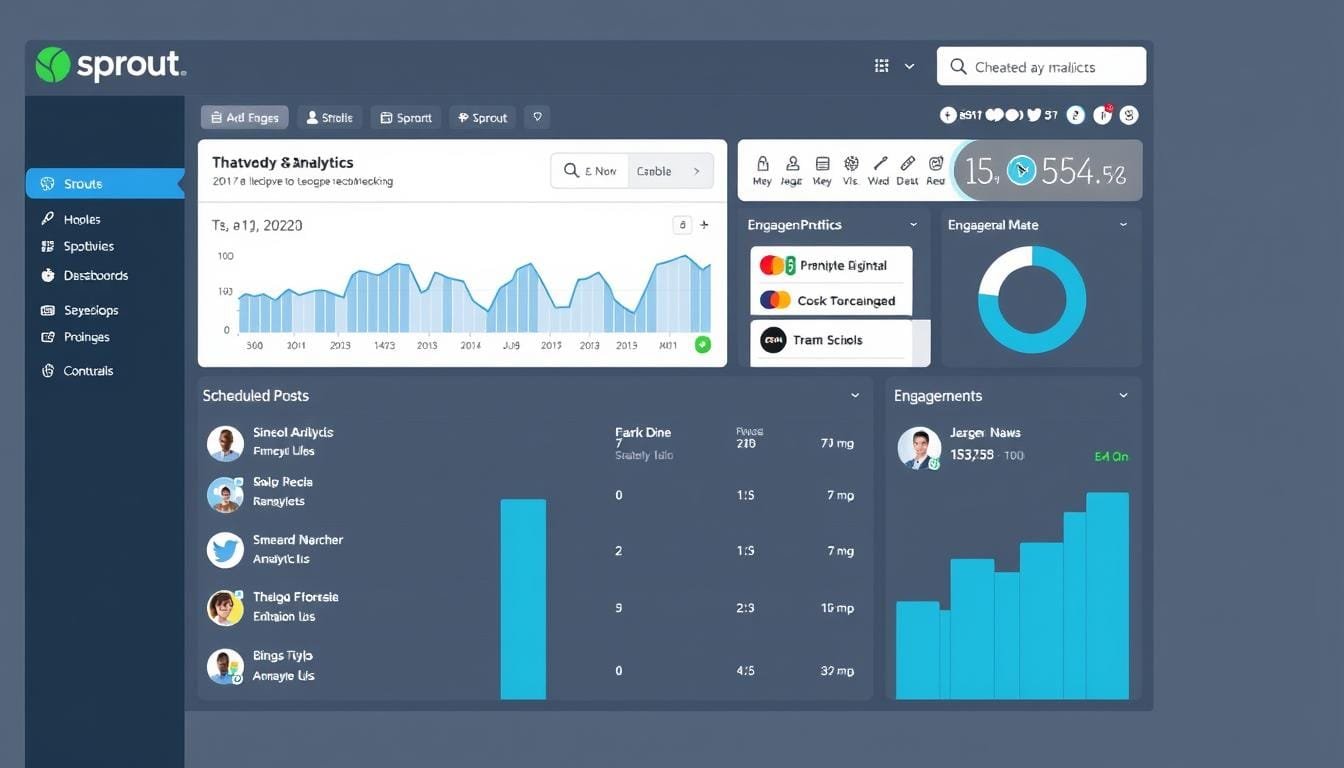Sprout Social vs Buffer: Quick Overview
Sprout Social
Founded in 2010, Sprout Social has established itself as a comprehensive social media management platform that excels in analytics, listening, and team collaboration. It’s recognized as an industry leader, particularly in the enterprise space, with numerous accolades including being named the #1 Best Software Product in G2’s 2024 Software Awards.
Sprout Social offers robust solutions for analytics, reporting, employee advocacy, influencer marketing, and customer care. The platform supports all major social networks and provides deep insights through its proprietary AI technology.
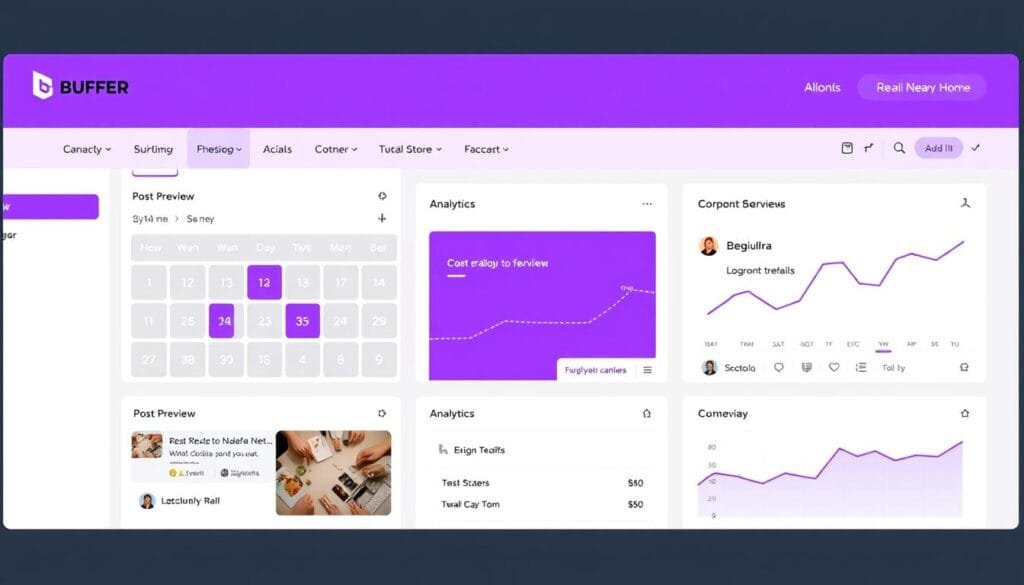
Buffer
Also founded in 2010, Buffer has built its reputation on simplicity and affordability. It’s best known for its straightforward social media scheduling and publishing capabilities, making it particularly appealing to small businesses, creators, and entrepreneurs with limited budgets.
Buffer offers solutions for scheduling, reporting, and team collaboration across major social platforms. Its user-friendly interface and affordable pricing tiers make it accessible for businesses just starting their social media journey.
Head-to-Head Feature Comparison
Before diving into the details, let’s compare the key features of Sprout Social and Buffer side by side to give you a quick overview of what each platform offers in 2025:
| Feature | Sprout Social | Buffer |
| Starting Price | $249/month | $6/month per channel |
| Social Profiles (Basic Plan) | 5 | 1 |
| Supported Platforms | Facebook, Instagram, Twitter, LinkedIn, Pinterest, TikTok, YouTube, WhatsApp, Reddit | Facebook, Instagram, Twitter, LinkedIn, Pinterest, TikTok, Mastodon, Google Business Profile, Shopify |
| AI Content Creation | Advanced AI Assist | Basic AI tools |
| Social Listening | Comprehensive | Limited |
| Analytics | In-depth with custom reports | Basic with Buffer Analyze |
| Team Collaboration | Advanced with workflow tools | Basic collaboration features |
| Customer Support | 24/5 phone, email, chat | Email and social media |
| Best For | Medium to large businesses, agencies | Small businesses, entrepreneurs, creators |
Content Creation and Publishing Capabilities
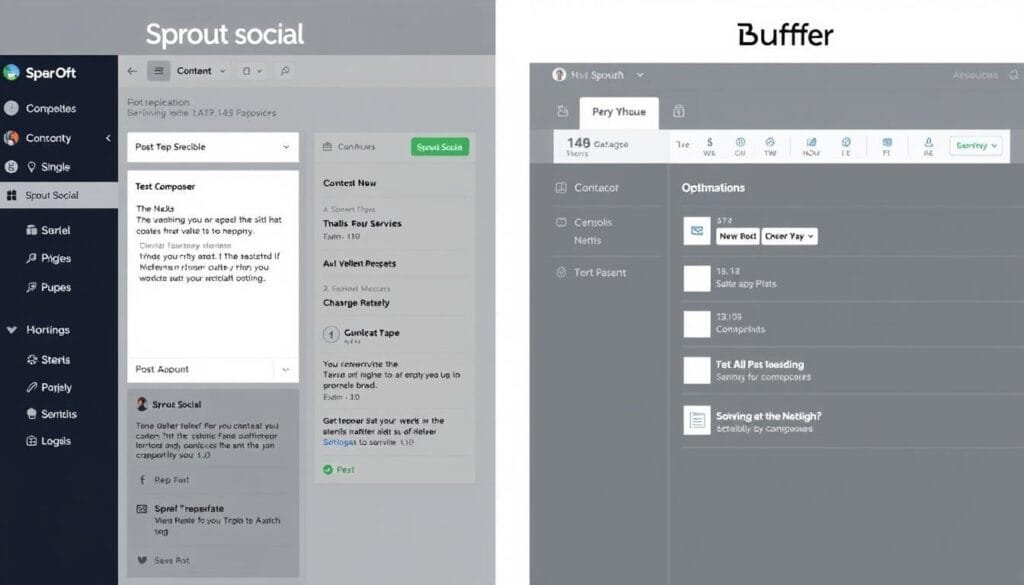
Sprout Social’s Content Creation Features
Sprout Social offers a comprehensive content creation experience with advanced features designed for strategic planning. The platform excels in providing detailed customization options for each social network, ensuring your content is optimized for every platform where you publish.
In 2025, Sprout Social has enhanced its AI capabilities with AI Assist, which integrates with their publishing, engagement, and listening solutions. This AI-powered tool helps users generate content ideas, optimize post copy, and suggest the best times to publish based on audience engagement patterns.
Also read: Hootsuite for Social Media Management: Dashboard, Tools & Pricing
Buffer’s Content Creation Features
Buffer takes a more streamlined approach to content creation, focusing on simplicity and efficiency. Its intuitive interface makes it easy to create and schedule posts across multiple platforms with minimal learning curve.
Buffer’s strength lies in its user-friendly content curation tools, which allow users to quickly generate engaging posts. The platform includes an image creator and the ability to repost popular content, making it particularly useful for businesses looking to maintain an active social presence without extensive resources.

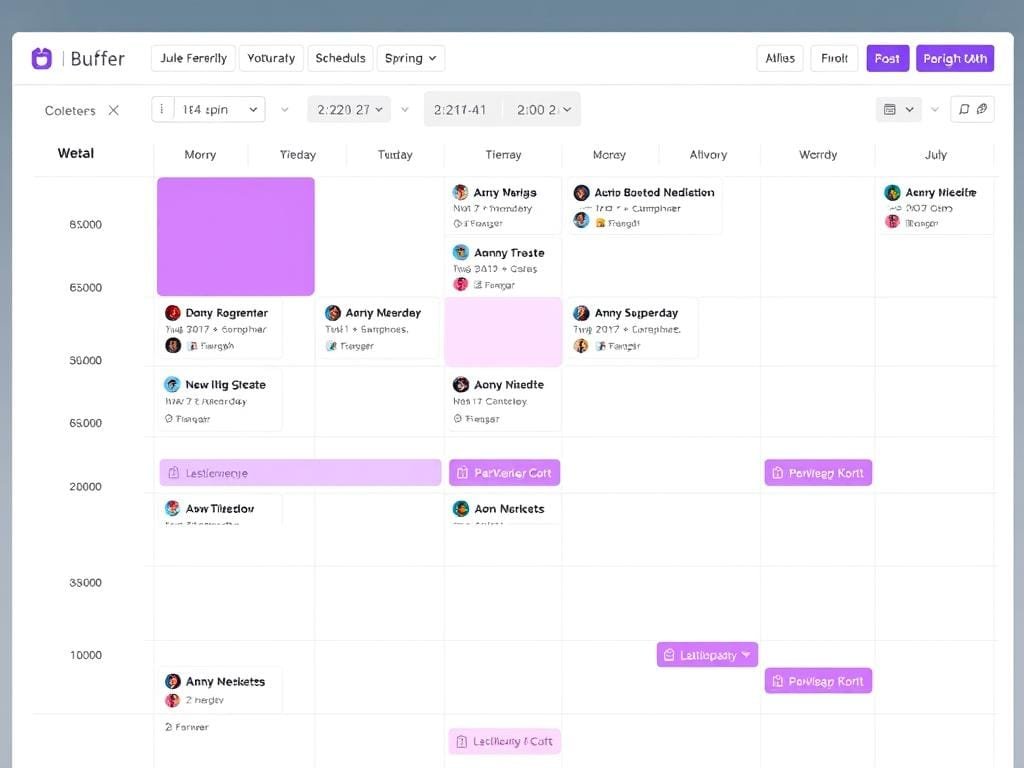
Sprout Social Strengths
- Advanced AI content generation capabilities
- Detailed platform-specific customization
- Comprehensive content optimization recommendations
- Integrated workflow with analytics and listening
- Preview posts as they’ll appear on each platform
Buffer Strengths
- Intuitive, user-friendly interface
- Efficient content curation tools
- Quick setup and minimal learning curve
- Affordable entry point for basic scheduling
- Clean, calendar-style overview of scheduled content
Social Media Analytics and Reporting
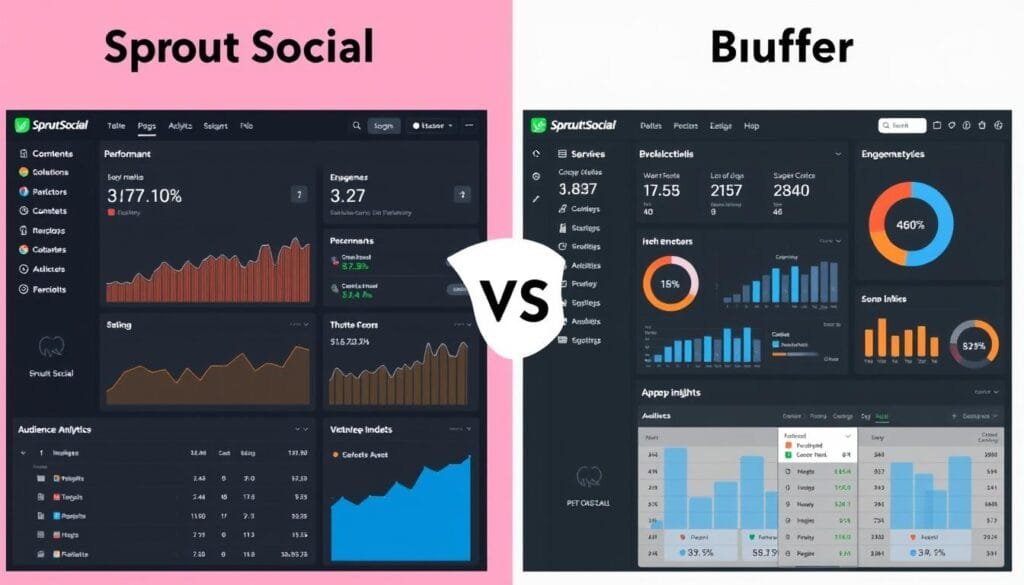
Sprout Social’s Analytics Capabilities
Sprout Social sets the standard for comprehensive social media analytics in 2025, offering in-depth insights across multiple platforms. Its robust reporting tools provide detailed data on audience behavior, content effectiveness, and competitor activities, enabling truly data-driven decision-making.
The platform excels in providing customizable dashboards that make it easy to track key metrics and identify trends. Sprout Social’s analytics capabilities are particularly valuable for brands that need to demonstrate social media ROI to stakeholders, as the detailed reports can clearly illustrate the impact of social strategies on business objectives.
Buffer’s Analytics Approach
Buffer takes a more streamlined approach to analytics with its Buffer Analyze tool. While it offers essential metrics for assessing post performance and general social media activity, it may not provide the depth that larger organizations require.
For small businesses and entrepreneurs, Buffer’s analytics provide sufficient insights to guide basic strategy adjustments. The platform focuses on making data accessible and actionable, even for users without extensive analytics experience.
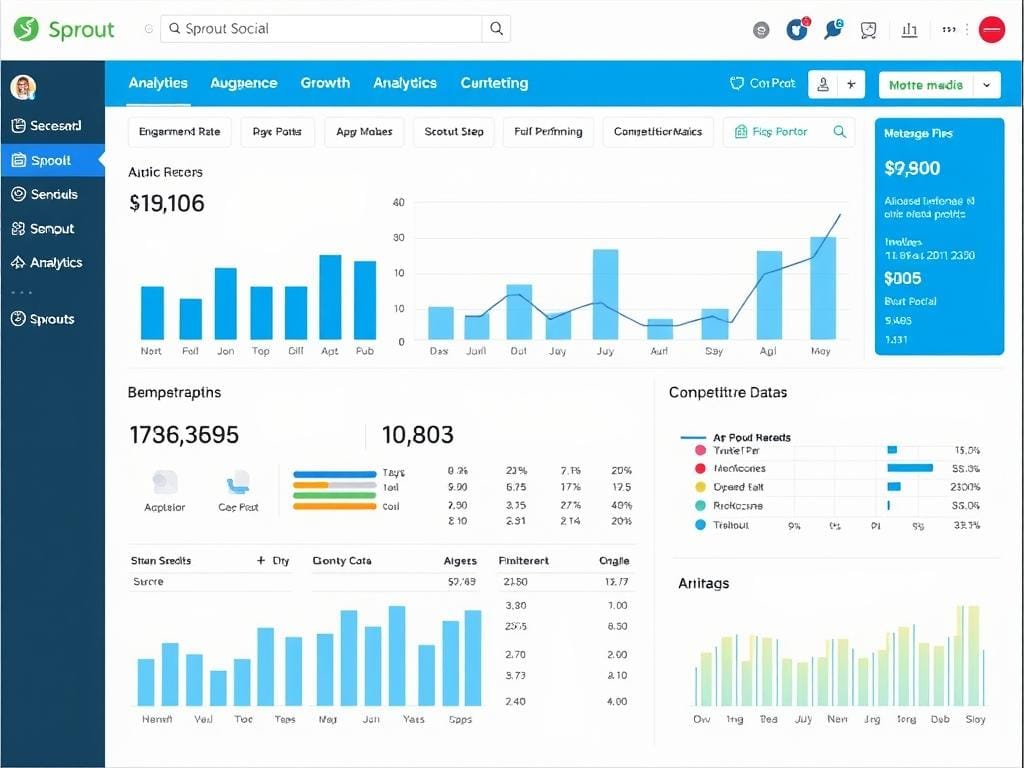
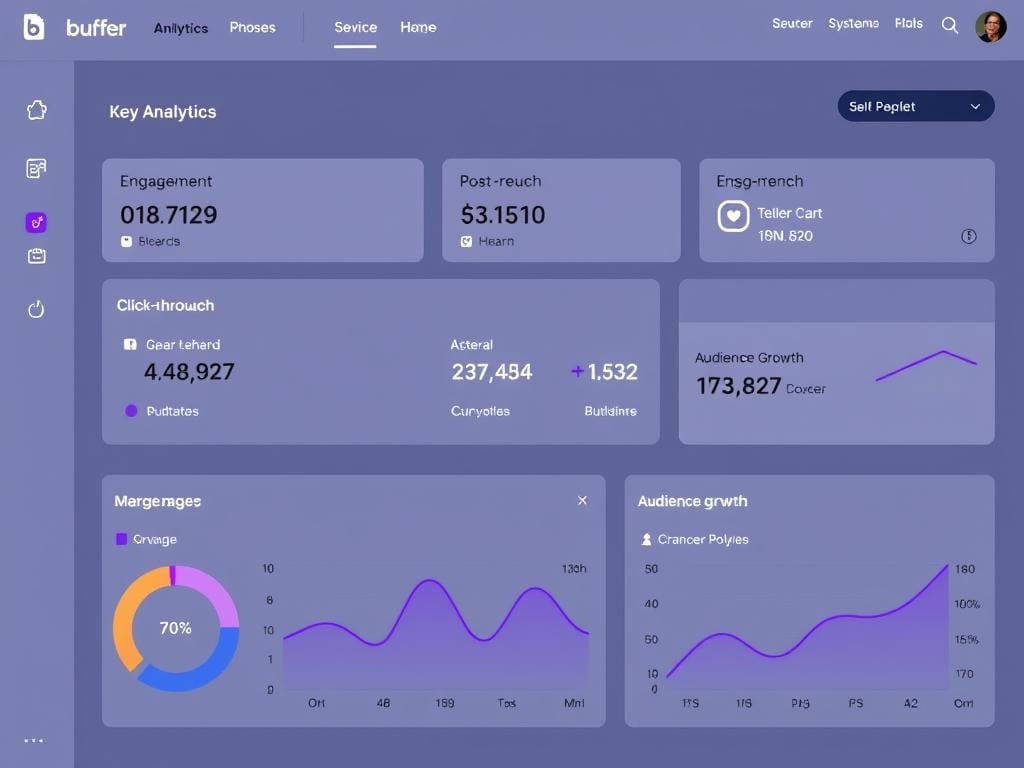
Social Media Engagement and Listening
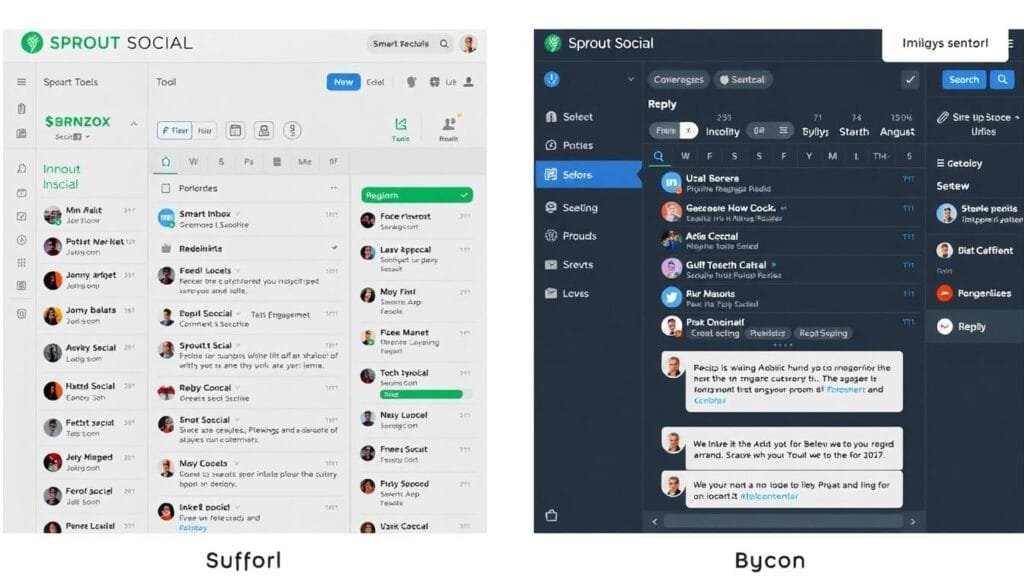
Sprout Social’s Engagement and Listening Tools
Sprout Social’s standout feature for engagement is its Smart Inbox, which consolidates messages and comments from multiple social networks into one cohesive feed. This centralized approach to managing interactions makes community management and customer engagement significantly more efficient.
The platform’s social listening capabilities are particularly powerful, allowing brands to monitor conversations, sentiment, and emerging customer issues related to both their brand and competitors. This enables proactive response and refined messaging strategies based on real-time market insights.
Buffer’s Engagement Approach
Buffer offers engagement tools through Buffer Reply, focusing on social listening and community management. The platform is particularly strong in Twitter analysis but has somewhat more limited features for engagement compared to Sprout Social, especially for platforms like Instagram.
For small teams managing moderate engagement volumes, Buffer provides sufficient tools to maintain connections with their audience. However, businesses with high engagement rates or complex customer service needs may find the capabilities less comprehensive.
Ready to improve your social media engagement?
Try Sprout Social’s comprehensive engagement tools with a 30-day free trial. No credit card required.
Team Collaboration Features
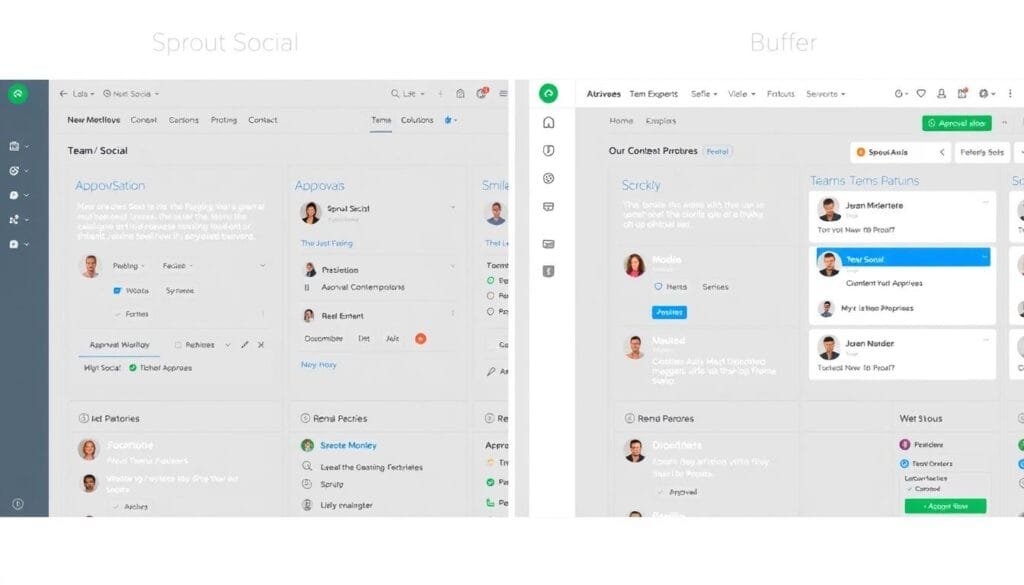
Sprout Social’s Collaboration Capabilities
Sprout Social is designed to cater to the collaborative needs of larger teams and organizations. The platform offers robust workflow tools, customizable user roles and permissions, and features that support structured, collaborative environments.
For agencies and enterprise teams, Sprout Social’s collaboration features enable efficient content approval processes and clear task assignment. The platform’s focus on team collaboration makes it an excellent choice for businesses with complex hierarchical structures or those managing multiple client accounts.
Buffer’s Team Features
Buffer provides more basic collaboration features tailored toward the needs of smaller teams. While effective for fundamental collaborative tasks like post drafting and comments, Buffer’s simpler approach to team collaboration may not meet the needs of larger organizations.
For small businesses or startups with straightforward approval processes, Buffer offers sufficient collaboration tools without overwhelming users with complex workflows. The platform’s strength lies in its simplicity and ease of use, even for team members with limited technical expertise.
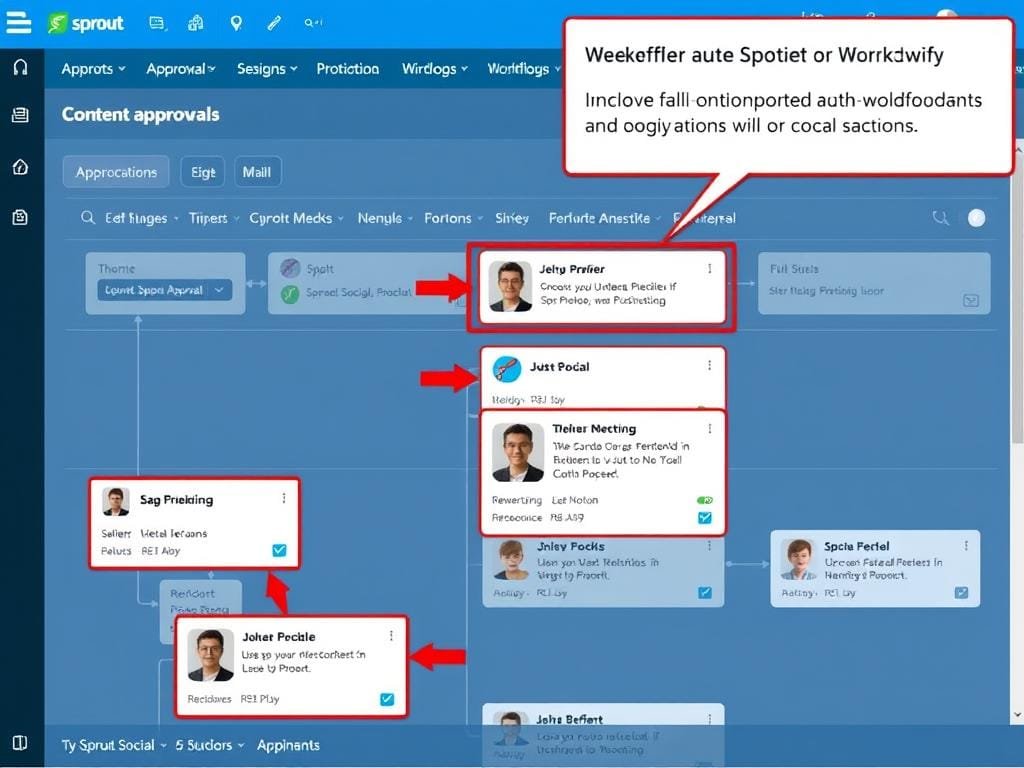
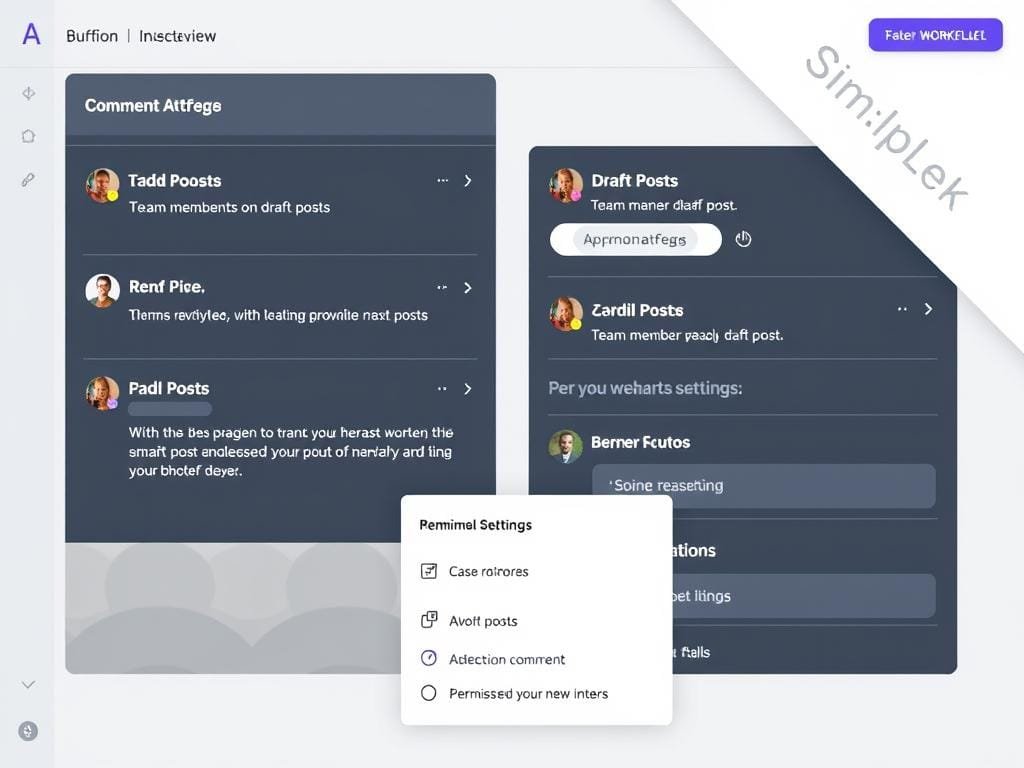
“Sprout Social excels in its comprehensive management features with unlimited client onboarding, per-post multi-user collaboration, and access management. Its content approval workflows help streamline the publishing process, but it’s worth noting that these advanced features are only available in premium plans.”
AI Capabilities for 2025
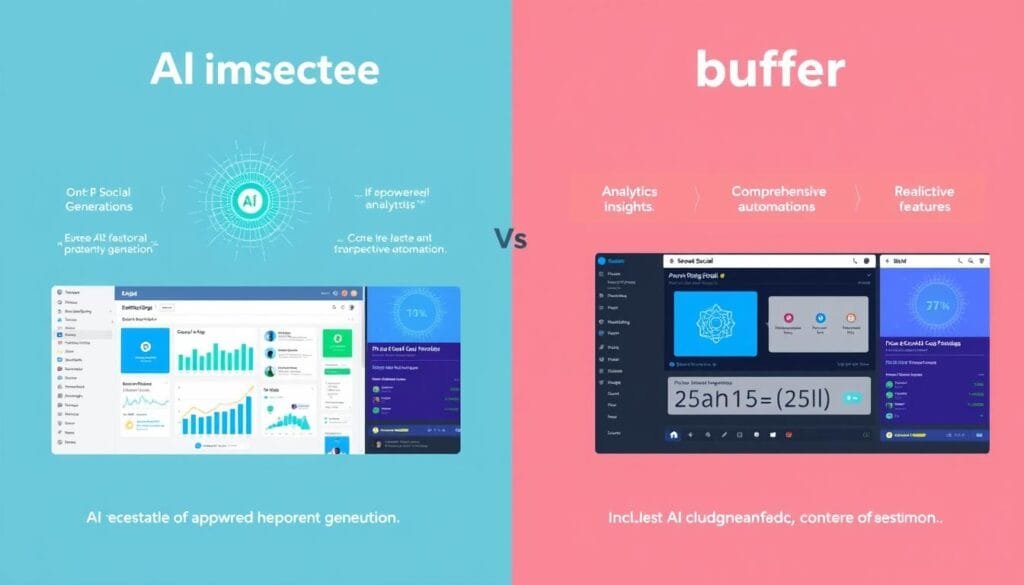
Sprout Social’s AI Integration
Sprout Social has made significant investments in AI technology, including the acquisition of Repustate in 2023 to enhance their in-house AI offerings. The platform’s AI Assist suite is powered by integration with OpenAI’s GPT model and seamlessly integrates into their Publishing, Engagement, and Listening solutions.
In 2025, Sprout Social’s AI capabilities include content generation, optimal posting time recommendations, sentiment analysis, and predictive analytics. These tools enable brands to work more efficiently while achieving greater impact through data-driven decision making.
Buffer’s AI Approach
Buffer has focused on implementing practical AI tools that enhance its core scheduling and publishing features. The platform offers AI-powered content suggestions and basic optimization recommendations to help users create more engaging posts.
While not as comprehensive as Sprout Social’s AI integration, Buffer’s approach makes artificial intelligence accessible to smaller businesses and individual creators who might otherwise find advanced AI tools overwhelming or cost-prohibitive.
2025 AI Trend Alert: Both platforms are adapting to the increasing importance of AI-generated content moderation and compliance tools as social platforms implement stricter guidelines around AI-created content. Sprout Social currently has more robust solutions in this area, while Buffer is rapidly developing comparable features.
Pricing and Scalability Comparison
| Plan Details | Sprout Social | Buffer |
| Entry-Level Plan | Standard: $249/month | Essential: $6/month per channel |
| Mid-Tier Plan | Professional: $299/month | Team: $12/month per channel |
| Advanced Plan | Advanced: $399/month | Agency: $120/month |
| Enterprise | Custom pricing | Not available |
| Free Trial | 30 days | 14 days |
| Additional User Cost | $199/user/month | Included in Team and Agency plans |
Sprout Social’s Pricing Structure
Sprout Social positions itself as a premium solution with pricing that reflects its comprehensive feature set. Starting at $249 per month for the Standard plan, it represents a significant investment, particularly for smaller businesses or those just beginning to formalize their social media strategy.
The platform’s scalability is excellent for growing organizations, with clear upgrade paths as needs evolve. However, the additional user cost of $199 per user per month can become a substantial consideration for larger teams.
Buffer’s Pricing Approach
Buffer offers a more accessible entry point with plans starting at just $6 per month per channel. This per-channel pricing model allows businesses to start small and gradually expand their social media presence as they grow.
For teams, Buffer’s pricing becomes particularly attractive, as additional users are included in the Team and Agency plans without per-user fees. This makes Buffer a cost-effective solution for collaborative social media management, especially for smaller organizations with limited budgets.
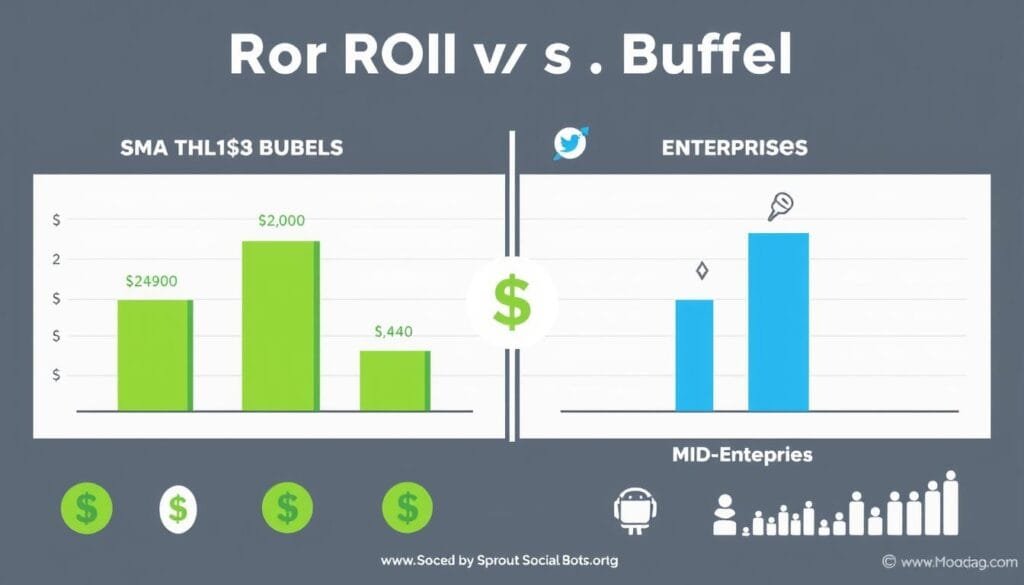
Find the right plan for your business
Try Buffer’s flexible pricing with plans starting at just $6/month per channel. No long-term commitment required.
User Experience and Brand Fit
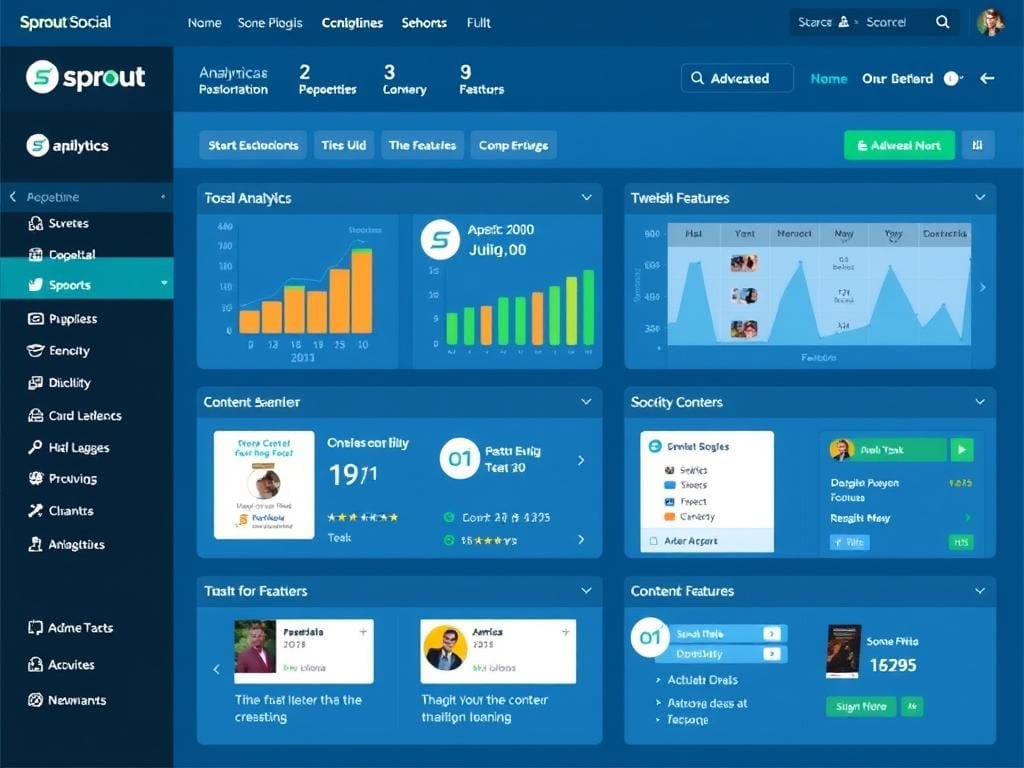
Sprout Social User Experience
Sprout Social balances comprehensive features with a user-friendly interface, striking a good balance between functionality and accessibility. The platform is designed to be welcoming to new users, offering guidance through its core features, which is a significant advantage for a tool with such a broad range of capabilities.
Despite its complexity, especially in terms of analytics and advanced features, Sprout Social maintains an approachable and intuitive user experience. The learning curve is steeper than Buffer’s, but the platform provides excellent onboarding resources to help teams get up to speed quickly.
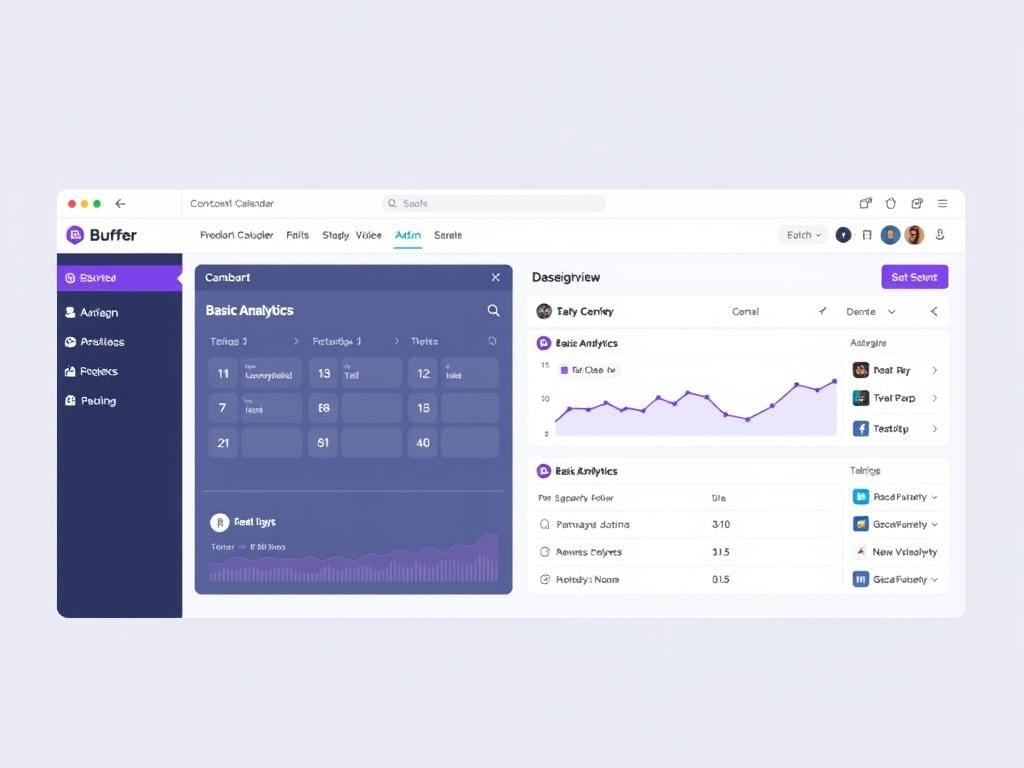
Buffer User Experience
Buffer is highly regarded for its ease of use, with a straightforward and intuitive interface that makes it particularly appealing to new users or smaller teams. The platform’s design is focused on clarity and simplicity, allowing users to get started almost instantly.
The clear delineation of its products – Publish, Reply, and Analyze – aids in this simplicity, making Buffer the ideal choice for those who prioritize a hassle-free, efficient user experience in managing their social media activities.
Ideal Brand Fit
Sprout Social is ideal for:
- Enterprise-level organizations with complex social strategies
- Brands managing multiple high-engagement social channels
- Marketing teams that need advanced analytics and reporting
- Businesses requiring sophisticated workflow management
- Companies with dedicated social media departments
- Brands focused on social listening and market intelligence
Buffer is ideal for:
- Small to medium-sized businesses with limited budgets
- Startups building their social media presence
- Solo entrepreneurs and content creators
- Teams seeking simplicity over advanced features
- Businesses new to social media management
- Companies with straightforward publishing needs
Customer Support Comparison
When evaluating social media management tools, customer support can be a decisive factor, especially when you encounter issues that could impact your social media presence.
Sprout Social Support
- 24/5 phone support
- In-app chat assistance
- Email support
- Comprehensive help documentation
- The Arboretum community forum
- Dedicated onboarding for larger customers
Buffer Support
- Email support
- Social media support (Twitter, Facebook)
- Help documentation
- Knowledge base articles
- No phone support
- Limited personalized onboarding
Pro Tips: Maximizing Your Social Media Management in 2025
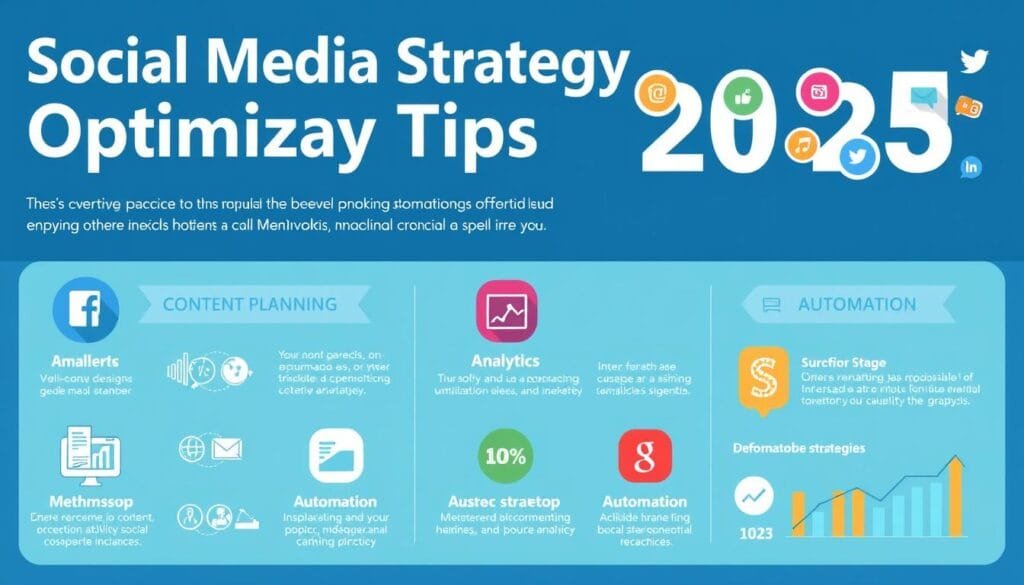
Pro Tips for Sprout Social Users
1. Leverage AI Assist for Content Optimization
Use Sprout Social’s AI Assist to analyze your highest-performing content and generate variations that maintain the same engagement patterns. Set up A/B testing experiments to continuously refine your content strategy based on AI-driven insights.
2. Create Custom Smart Rules for Engagement
Configure Smart Rules in the Social Inbox to automatically categorize and prioritize messages based on sentiment, keywords, or user profiles. This allows your team to focus on high-priority interactions while ensuring no message goes unanswered.
3. Integrate with Your Broader MarTech Stack
Maximize Sprout Social’s value by connecting it with your CRM, customer service platform, and business intelligence tools. Use the Tableau integration to combine social data with other business metrics for comprehensive performance analysis and ROI tracking.
Pro Tips for Buffer Users
1. Master the Content Calendar for Consistency
Use Buffer’s calendar view to plan content themes by week or month, ensuring a balanced mix of promotional, educational, and engagement content. Color-code your posts by category to visually track your content distribution strategy.
2. Optimize Posting Times with Analytics
Analyze your Buffer Analyze data quarterly to identify optimal posting times for each platform. Create custom scheduling slots based on these insights, and regularly adjust your posting schedule to adapt to changing audience behaviors.
3. Streamline Workflow with Browser Extension
Install the Buffer browser extension to quickly share content you discover while browsing. Create a content curation routine where team members submit potential posts through the extension, which managers can then review and schedule in batches.
Conclusion: Which Tool is Best for Your Brand in 2025?
After our comprehensive analysis of Sprout Social vs Buffer, it’s clear that both platforms offer valuable features for social media management, but they cater to different needs and business sizes.
The best social media management tool isn’t necessarily the one with the most features—it’s the one that aligns with your specific business needs, team structure, and growth trajectory.
Choose Sprout Social if:
- You’re a medium to large business with complex social media needs
- Advanced analytics and reporting are critical to your strategy
- Social listening and market intelligence are priorities
- You need sophisticated team collaboration and workflow tools
- Your budget allows for a premium solution ($249+ per month)
Choose Buffer if:
- You’re a small business, startup, or individual creator
- You need a straightforward, easy-to-use platform
- Your primary focus is efficient content scheduling and publishing
- You have budget constraints and need an affordable solution
- You prefer simplicity over advanced features
In 2025, the social media landscape continues to evolve rapidly, and your management tools need to keep pace. Both Sprout Social and Buffer are continuously updating their platforms to adapt to new features, algorithms, and best practices across social networks.
Ultimately, the right choice depends on your specific requirements, team size, and budget. We recommend taking advantage of the free trials offered by both platforms to experience their interfaces, workflows, and features firsthand before making your decision.
Ready to elevate your social media management?
Start with a free trial of the platform that best matches your needs:
Is Buffer better than Sprout Social for small businesses?
For most small businesses, Buffer offers a more accessible entry point due to its lower pricing and simpler interface. At $6 per month per channel, Buffer allows small businesses to start managing their social media professionally without a significant investment. However, if your small business has complex social media needs or requires advanced analytics, Sprout Social might be worth the higher price point.
Does Sprout Social offer better analytics than Buffer?
Yes, Sprout Social provides more comprehensive analytics capabilities compared to Buffer. Sprout Social offers detailed insights into audience behavior, content performance, and competitor activities with customizable reporting options. Buffer’s analytics are more basic, focusing on essential metrics like engagement rates and post performance. For businesses that make data-driven decisions and need to demonstrate social media ROI, Sprout Social’s analytics tools are generally superior.
Also read: ActiveCampaign Email Automation Guide: CRM + Campaign Setup
Can I manage multiple clients with Buffer or Sprout Social?
Both platforms support managing multiple clients, but with different approaches. Sprout Social offers more robust client management features with advanced permissions, approval workflows, and detailed reporting for agencies. Buffer’s Agency plan allows for client management, but with fewer specialized agency features. For agencies managing numerous clients with complex needs, Sprout Social typically provides a more comprehensive solution, while Buffer may be sufficient for agencies with simpler client requirements.
